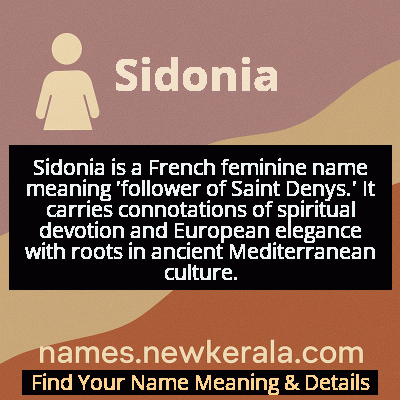Sidonia Name Meaning & Details
Origin, Popularity, Numerology Analysis & Name Meaning of Sidonia
Discover the origin, meaning, and cultural significance of the name SIDONIA. Delve into its historical roots and explore the lasting impact it has had on communities and traditions.
Name
Sidonia
Gender
Female
Origin
French
Lucky Number
8
Meaning of the Name - Sidonia
Sidonia is a French feminine name meaning 'follower of Saint Denys.' It carries connotations of spiritual devotion and European elegance with roots in ancient Mediterranean culture.
Sidonia - Complete Numerology Analysis
Your Numerology Number
Based on Pythagorean Numerology System
Ruling Planet
Saturn
Positive Nature
Ambitious, efficient, realistic, and authoritative.
Negative Traits
Materialistic, stressed, confrontational, and can be overly ambitious.
Lucky Colours
Dark blue, black.
Lucky Days
Saturday.
Lucky Stones
Blue sapphire, amethyst.
Harmony Numbers
2, 4, 6.
Best Suited Professions
Business leaders, managers, financial services, law enforcement.
What People Like About You
Leadership, determination, organizational skills.
Famous People Named Sidonia
Sidonia von Bork
Literary Character
Central character in Wilhelm Meinhold's Gothic novel 'Sidonia von Bork' (1847)
Sidonia Hedwig Zäunemann
Poet
German poet known for her adventurous spirit and early feminist writings
Sidonia Werner
Activist
German LGBT rights activist and co-chair of the Lesbian and Gay Federation in Germany
Sidonia Jędrzejewska
Politician
Polish politician and Member of the European Parliament
Name Variations & International Equivalents
Click on blue names to explore their detailed meanings. Gray names with will be available soon.
Cultural & Historical Significance
The name's association with Saint Denys (Dionysius) connects it to early Christian martyrs and the spread of Christianity in Gaul, giving it particular significance in French religious history. In literature, Sidonia appears in various Gothic and romantic works, often portraying characters of noble bearing with complex spiritual dimensions. The name carries echoes of European aristocracy while maintaining accessibility through its saintly associations, creating a unique cultural position that bridges ancient history, religious tradition, and aristocratic elegance.
Extended Personality Analysis
Women named Sidonia are often perceived as possessing an elegant, refined demeanor combined with intellectual depth and spiritual sensitivity. They typically exhibit strong intuition and emotional intelligence, allowing them to navigate complex social situations with grace and diplomacy. Historically associated with nobility and refinement, Sidonias are thought to carry themselves with natural dignity while maintaining approachability and warmth.
Their connection to the name's spiritual origins often manifests as philosophical curiosity and a tendency toward introspection. Many Sidonias demonstrate artistic talents or appreciation for cultural pursuits, alongside practical wisdom in daily affairs. They are frequently described as loyal friends and compassionate listeners who value meaningful connections over superficial relationships. The name suggests a balance between traditional values and independent thinking, creating individuals who respect heritage while embracing progressive ideas, making them both anchors in their communities and agents of thoughtful change.
Modern Usage & Popularity
In contemporary times, Sidonia remains a relatively rare but cherished name, particularly among families seeking distinctive names with historical depth and European elegance. While never achieving widespread popularity, it maintains steady usage in France, Germany, and among diaspora communities. The name has seen modest revival in recent decades as part of the trend toward vintage and saintly names, appealing to parents looking for alternatives to more common classical names. In English-speaking countries, Sidonia is considered exotic and sophisticated, often chosen by parents with European heritage or those appreciating its literary and historical connections. Current naming databases show it ranking outside the top 1000 names in most countries, preserving its unique character while ensuring it remains recognizable and easy to pronounce across cultures.
Symbolic & Spiritual Meanings
Symbolically, Sidonia represents the convergence of ancient wisdom and spiritual devotion, embodying both worldly sophistication and inner contemplation. The name evokes images of Mediterranean heritage, suggesting warmth, richness, and cultural depth akin to the historic Phoenician city from which it derives. As a follower of Saint Denys, it carries connotations of faith, martyrdom, and intellectual pursuit of divine truth. The name symbolizes graceful strength—the ability to maintain elegance and composure even through challenging circumstances. It also represents the bridge between ancient and modern, traditional and contemporary, making it emblematic of individuals who honor heritage while embracing progress. In metaphorical terms, Sidonia suggests a deep-rooted tree that reaches toward the heavens—firmly grounded in history and tradition while aspiring toward spiritual and intellectual heights.

